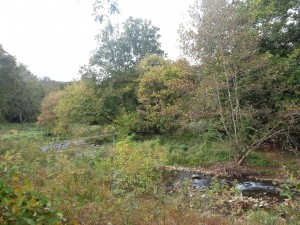Pa. legislature passes bill changing buffers for cleanest streams
-
Katie Colaneri

Valley Creek is a prized trout stream that feeds into the Schuylkill River and runs through Valley Forge National Historical Park.
A bill eliminating a requirement for 150-foot buffers between new developments and Pennsylvania’s cleanest streams is now headed to Governor Tom Corbett’s desk.
The House passed HB1565 late Wednesday, which makes forested stream buffers an optional tool to other “substantially equivalent” practices that would preserve water quality and prevent erosion and sedimentation in specially protected watersheds. An amendment approved by the Senate earlier this week also requires developers to offset disturbances within 100 feet of a stream by planting a replacement buffer elsewhere in the same watershed.
The law only applies to projects that require stormwater discharge permits and that are adjacent to one of Pennsylvania’s “high quality” or “exceptional value” streams – a small percentage of waterways.
The Pennsylvania Builders Association lobbied in favor of the bill, arguing the 150-foot rule was too onerous for certain projects, despite the fact developers could seek waivers from the state Department of Environmental Protection.
Supporters also said the buffers were unfair to landowners.
“Oftentimes, this has been seen as an instance of eminent domain without compensation as landowners could be prevented from using their own property,” said Rep. Marcia Hahn (R-Northampton), the bill’s primary sponsor, in a statement following House committee approval last month.
Environmental groups fought the legislation, decrying it as a step backwards.
“The science is clear that forested riparian buffers have no peer against any other pollution reduction practice in terms of protecting and restoring the biological and chemical and physical health of our most pristine rivers and streams,” said Harry Campbell, Pennsylvania Executive Director of the Chesapeake Bay Foundation.
If Corbett signs off on the bill, environmentalists said they will be looking to see how regulators interpret the changes.
“DEP is required to maintain the exceptional value and high quality water quality standards where these permits are going in,” said Myron Arnowitt with Clean Water Action. “Whether they’ll be able to do this the way this bill envisions seems unlikely to us.”
















